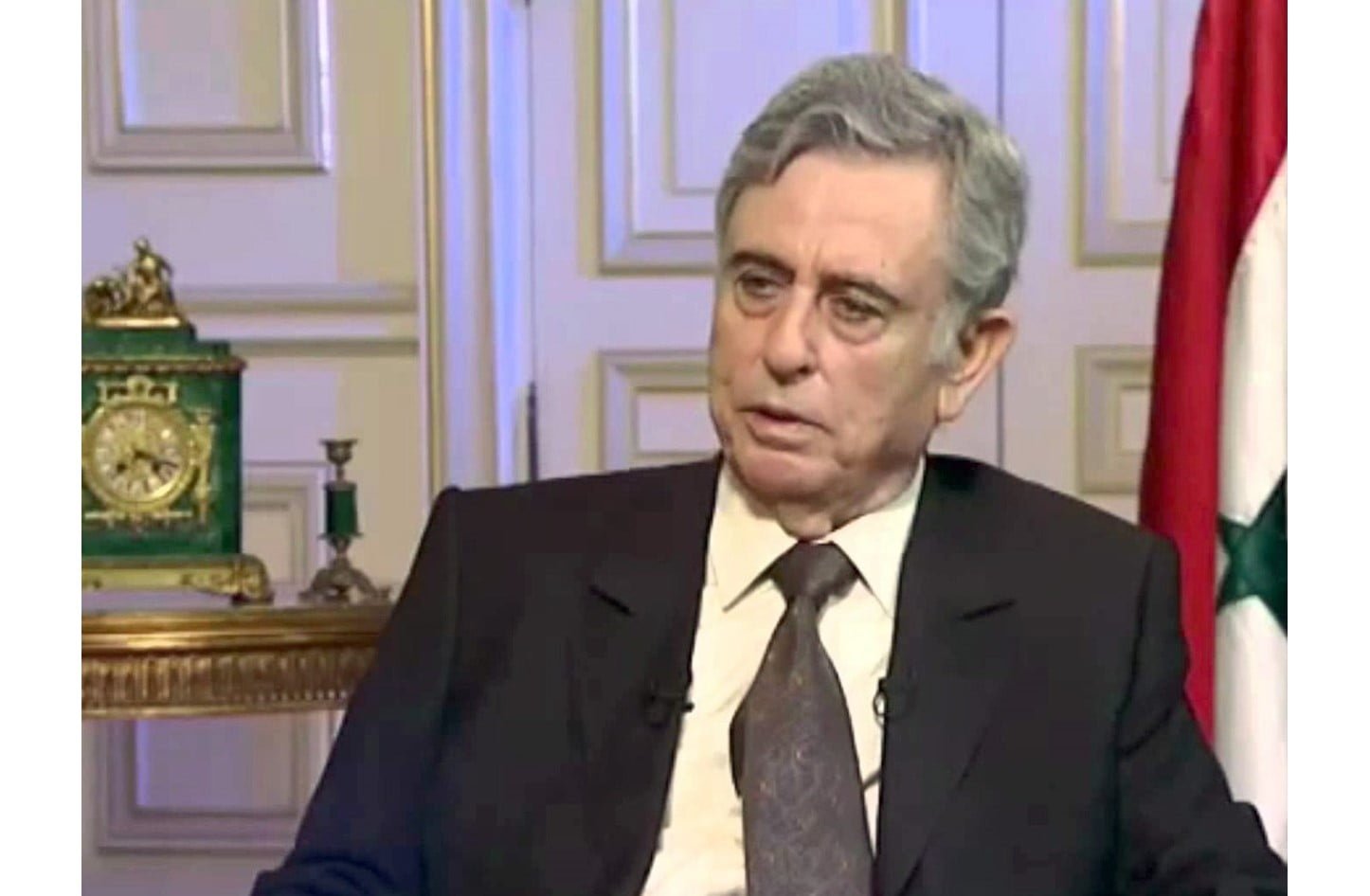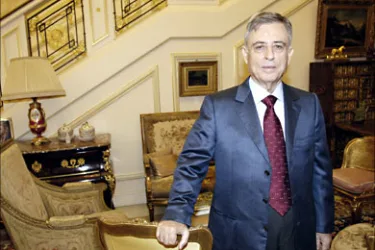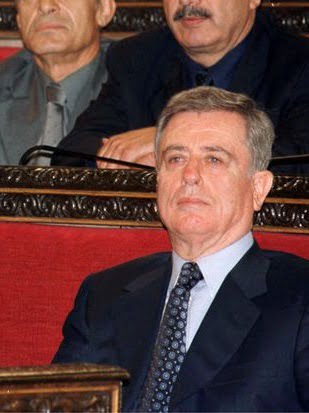The cold blue eyes of Abdel Halim Khaddam shed no tears for Ariel Sharon this afternoon. For more three decades, Khaddam was the right-hand man of Syrian dictator Hafez Assad in open wars and diplomatic showdowns with Israel, often turning Lebanon into the main battleground. Sharon’s drive on Beirut in 1982 handed the Syrians a stunning defeat. But Syria slowly won its vengeance, supporting Hizbullah’s relentless campaign of terror and attrition–a war that has never really ended. “As far as Sharon is concerned, his death or disappearance will not change anything,” Khaddam told NEWSWEEK after the Israeli prime minister suffered a major stroke. “The difference between the Israeli factions is less one of substance than of degree. There will [at most] be a change in the map of Israeli political alliances.” He sees no chance of negotiations or peace agreements any time soon.
Yet this same Abdel Halim Khaddam, who continued to serve as Syria’s vice president after Bashar Assad inherited the top job from his father in June 2000, is now presenting himself as the man who might help replace the much-hated and increasingly isolated regime in Damascus. Last summer Khaddam left Syria for exile in France. Until last week, he said nothing in public. But in the last few days, from a luxurious townhouse in one of the most exclusive neighborhoods of Paris, Khaddam has gone public with vague plans to bring democracy to Syria and with specific accusations against the regime he once served.
For almost two hours this afternoon, Khaddam sketched a portrait of life at the top in what he freely discusses as “the mafia state” run out of Damascus. “There is a gathering of several levels of mafia,” he said, “The family mafia. The security mafia. The friends’ mafia.” And he presented a stunning narrative of the growing hatred Bashar Assad felt toward Lebanon’s billionaire former prime minister Rafik Hariri, who was blown up on the Beirut waterfront by a massive explosion last February.
In the aftermath of that killing, Lebanon erupted in protests against Syria’s long occupation. Under pressure from hundreds of thousands of people in the streets as well as from the governments of the United States, France and Saudi Arabia, Damascus was at last forced to withdraw all its troops from Lebanese territory under the terms of United Nations Security Council Resolution 1559, which Hariri had quietly supported. Some of the Lebanese security chiefs who served the Syrian occupation were jailed. A special U.N. investigation was launched, and two interim reports thus far have pointed the blame for the assassination at the Syrian regime. Yet Syria’s client president of Lebanon, Emile Lahoud, remains in office. (It was Bashar Assad’s insistence that Lahoud’s term be extended that first provoked the falling out with Prime Minister Hariri that led to his resignation in October 2004.) The voices of protest have been muted by the murder and maiming of prominent critics. The Syrian occupation has ended, but a reign of fear continues.
Following, with a few explanatory footnotes, are some excerpts from this afternoon’s conversation with Khaddam:
NEWSWEEK: Let’s go directly to the question of threats against Rafik Hariri. What did you hear exactly and when did you hear it and who did you hear it from?
Abdel Halim Khaddam: The threats started from several people. From President Bashar Assad. From Rustom Ghazaleh [the Syrian general who served as proconsul in Lebanon until the withdrawal]. And from other Lebanese officials who are closely connected to the Syrian government. These threats created a general atmosphere in Lebanon.
But were people talking directly to you about this? Were they saying, “You know, Abdel Halim, we’re going to get rid of Hariri if he continues defying us”?
Not like that, no. It’s unthinkable that someone would say, “We’re going to get rid of Hariri.” But what was said to me directly and in the [Syrian Baath Party] Politburo made it very clear there was a great hatred for Rafik Hariri, and there were clear accusations that he was working against the Syrian interests. What was said to me directly–maybe two months prior to the extension of the term of Lahoud–I had a meeting with President Bashar Assad at 9 o’clock in the morning. When I visited him he was nervous. He immediately told me, “I had Hariri visiting. I brought him in the morning along with Ghazi Kanaan, Rustom Ghazaleh, and Mohammed Khalouf,”* who are the main security people responsible in Lebanon. And then he started telling me what he told Mr. Hariri: “You are working against Syria. You are working to bring a new president … You should know that I am the decision maker. Whoever works against my will, I will crush him.”
So, when President Assad finished telling me what happened, I said, “What did you do? How dare you talk to the prime minister of Lebanon in that way? How can you use that kind of language, especially in front of junior Syrian generals? He’s the prime minister of Lebanon, not a public worker in Syria.” I told him, “We paid blood in Lebanon, and we lost a considerable amount of money to get equilibrium among all parties in Lebanon. You were supporting Lahoud. You finished [off] the Taif Accords.** What did you do?”
He realized he had made a mistake. He asked me to get in touch with Prime Minister Hariri and try to put him at ease. In fact, when Prime Minister Hariri left the office of the president after that meeting, his blood pressure was so high that his nose started bleeding. Ghazi Kanaan took him to his private office and got him medical attention. The next day I called Prime Minister Hariri and I asked him to visit me in Damascus. He said, “I will never visit Damascus again in my life.” I told him, fine, come to my summer residence, which is outside Damascus. Indeed, he came. He was sad and concerned, and I tried to calm him and reassure him. This is one example of the threats that were exerted on Mr. Hariri.
In one of the past party meetings, the Politburo was discussing the U.N. Resolution 1559. Assad said, “This resolution was cooked by Prime Minister Hariri and [French] President [Jacques] Chirac, and Hariri is working against the interests of Syria.” He said that Prime Minister Hariri tried to gather the Sunnis around him, and this is against the interests and security of Syria.”
Ten days before the assassination took place, President Bashar Assad started calling his friends in Lebanon to come to visit him … A lot of Lebanese close to the Syrian government started questioning the patriotism and nationalism of Rafik Hariri.
Where do you think Bashar Assad got these ideas about Hariri?
It is the Lebanese security forces around Lahoud. They are writing reports against Hariri. President Lahoud sends those reports to President Assad. President Assad resends those reports to Rustom Ghazaleh to check them out. But Rustom Ghazaleh and Jamil Sayyed [a Lebanese security chief, now in jail] are the ones who initially made those reports, so after checking with Rustom Ghazaleh, the answer is, “Definitely, it matches, it’s authentic information.”
Looking at what you’ve said about the threats to Hariri, the strong implication is that you believe people in the Syrian government killed him. Do you?
I don’t want to get into the work of the United Nations investigation committee. I just present facts. The investigation committee will conclude the truth. To answer the other part of the question, [if] there is any Syrian involvement: According to the internal politics of Syria, nobody can take this decision but the president, because this operation needs a lot of resources, in terms of finance and personnel. And no Syrian general can provide those kinds of resources, both financial and personnel, unless there is a [presidential] decision.
One of the dossiers you handled was Iraq. NEWSWEEK has reported from the ground that many insurgents have gone through Syria. We believe a lot of Iraqi Baathist money has come into Syria. How would you describe the relationship between Syria and the Iraqi insurgency, both Baathists and jihadis?
I followed the Iraqi file closely until 2004. The point of concern for us in Iraq was the partition of Iraq and the creation of religious friction in Iraq between Sunnis and Shiites. Accordingly, our effort was to ease up the religious conflict between the Sunnis and the Shiites. And I personally met with many Iraqi delegations [after the U.S. invasion] and those delegations were diversified. There were some pro-American and some anti-American, some pro-Kurd and some anti-Kurd, Sunnis and Shiites. And our message was the same: Iraqi unity. I met with members of the governing council, and most of them were allies of Syria. We used to deal with them in order to bring down the regime of Saddam Hussein.***
Second, as far as the Baath Party was concerned, there were no communications or contacts between the Baath Party of Iraq and the Baath Party in Damascus. There were open relations between the two governments for economic reasons, but not at the political or at the Baath level in any way.
The issue of border crossing?
Look, I’m outside Syria now. I’m in conflict with the present regime. But I can assure you no insurgent crossed the border from Syria to Iraq by the decision or with the knowledge of any [part of the] Syrian government. There were some border crossings for sure. We have a Syrian law that any Arab passport holder can get into Syria without a visa. Maybe there were some Arab nationals who got into Syria and illegally crossed the border to Iraq. During the war, there were a lot of Syrians who went into Iraq for jihad. Some thousands. But what happened with them? They came back, and they said they were deceived by the very bad treatment they received from the people of Saddam Hussein.
Are you concerned that Syria, which is close to Iran, will become a victim of the growing conflict between Iran and the United States?
I think that no military action is imminent. The region cannot tolerate military action, nor can Europe or the United States, at the time being. Not against Syria, nor Iran. I think military action is not the question. There is no reason for it.
There was an interesting item in the Iranian press blaming you for giving the Americans information about Iran’s nuclear program? Have you?
I thank the Iranian press that they say that I have a lot of well-connected informants within Iran that can pass me such valuable information to pass to the States.
Did Iran ever talk to you about its nuclear program, perhaps as deterrence?
This subject was never brought up in any way in any discussion in any meeting with the Iranians. Here I would like to state that a lot of people who are talking about Iran, they don’t know anything about Iran. They are extremely conservative, and it is very hard to find out what they are really thinking. You can never understand what they want unless they clearly say what they want.
Do you think you will ever be able to go back to Syria?
Yes, I will be back. And it’s not in the distant future that I’ll be back.
What is the actual picture you have of the way things will develop in the next few months.
When the scenario starts to materialize all the people are going to see it. [But] if there is a big political agenda it is not feasible to make it public in the press.
Does your vision of Syria include any members of the Assad family?
The Assad family is one family in Syria. Whoever rules Syria will be decided solely by voting and ballots. Whoever gets the ballots, he will make the decision along with the Syrian people in that regard.
You’re not afraid that the Muslim Brotherhood will get all the ballots?
No. In Syria, Christians and Muslims have a religious consciousness, but they are not fanatics. It’s a kind of mosaic of religions in equilibrium. And the Muslim Brothers now have enhanced their way of thinking, and they have come up with a new liberal agenda. And naturally when we talk about an open and democratic state, everyone is welcome to present his agenda.



